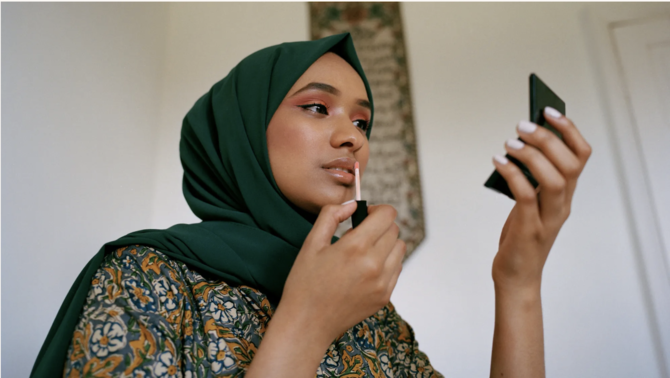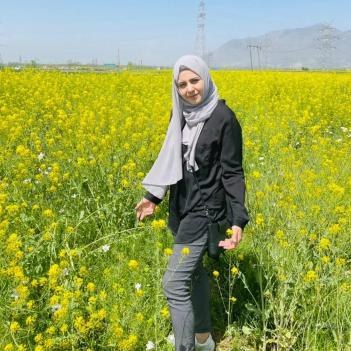SAO PAULO: With millions of views, videos in which Latin American Muslim women talk about their faith and show their personal lives have become more and more common on social media over the past few years.
In a region where Christianity is still seen as the norm, Islamic influencers face great challenges to succeed in the digital sphere.
Some of them are managing to do it, with creativity, charisma and humor. One such influencer is Mariam Chami, a 31-year-old nutritionist from the Brazilian city of Sao Paulo.
The daughter of a Lebanese father and a Brazilian mother who converted to Islam, Chami was educated in a Muslim school and only felt the weight of wearing a hijab in a Catholic-majority country in adulthood.
“In the beginning, I made videos for Muslim girls who didn’t have much knowledge about religion,” she told Arab News.
“But then I started to produce content with the goal of explaining Islam and reducing the prejudices that Brazilians have against Muslims.”
On TikTok, where she is followed by 1.1 million people, Chami discusses controversial topics for a very liberal country like Brazil such as burkinis — the clip where she wore one had more than 900,000 views — or why her sister-in-law, who is also Muslim, does not wear a hijab. Chami does all that with humor.
“I’ve been supported by my community and by religious leaders,” she said. “Given that I reach many people, I am — along with other Muslim influencers — combating religious intolerance with my work, and making more people admire our religion.”
One of Chami’s concerns is to show that Muslim women are not the oppressed victims of men, something that comes to mind among many Latin Americans when they see a woman wearing a hijab. Feminist movements in Brazil still cultivate that kind of prejudice, she said.
“I believe feminism is selective: It struggles for a woman’s right to be whatever she wants, but if she decides to be Muslim and wears her (Islamic) garments, she’s put aside and oppressed by those (feminist) women,” she added.
Colombian lawyer and digital influencer Amira Ubaida Sanchez also tries in her videos to deal with the most common misconceptions about Muslim women in her country.
“Me and my sister studied law together. Seeing us with a hijab, people in the university would frequently ask us, with an expression of surprise, if we as Muslim women are allowed to study,” she told Arab News.
In her work as an attorney, the 24-year-old usually represents Christian Colombian women who have been abandoned by their partners with their children and no money.
The daughter of a Colombian man who converted to Islam 40 years ago and became a Muslim leader in Bogota, she received a religious education that she now uses to convey complex messages in two-minute clips.
On TikTok, her account @conelvelo — “with the headscarf” in Spanish — has 43,600 followers.
Her father, Imam Carlos Sanchez, said: “I’ve never told any of my daughters to do this or that. Amira decided for herself to talk about Islam, which she does with great competence. I couldn’t be prouder.”
Making Islam known in Latin America is not an easy task, he added. Until the end of the 20th century, Catholicism was the official religion in countries such as Colombia.
Cultural differences also complicate Latin Americans’ understanding of Islamic concepts.
That is why Amira always uses straightforward language and includes funny elements in her videos.
“Many people want to disseminate Islam in Latin America, but they talk about ‘sunnah’ and ‘hadith,’ and nobody knows what those words mean here,” she said.
Nallely Khan, a 30-year-old Mexican who lives with her Muslim husband in India, said it is not easy to deal with Islamic issues on the internet for a Latin American audience.
“My goal isn’t so much to discuss Islam, but to show the way of living that we have, our daily life. At times I have to explain religious matters, and Latin Americans may disagree,” she told Arab News. “Some people don’t like Islam.”
Khan was born in a Catholic family but converted to Islam as a teenager. She said it was difficult to find materials about it in Mexico, but “now we have many organizations working on the dissemination of Islam in the country.”
Her YouTube channel Nana India Vlogs has 147,000 subscribers. She mainly portrays her life in India with her family, with a focus on the cultural differences with Mexico. But the Islamic dimension can be seen in many of her videos.
Her biggest hit until now has been the series “India and my love story,” in which she describes how she converted to Islam, how she met her husband, and how she discovered that he had a first wife only after their marriage (the woman ended up divorcing him). The three videos have had more than 2.5 million views.
“I don’t consider myself to be an influencer because I know I’m not a perfect person. I always try to become a better Muslim,” she said.
“I just hope to keep showing my life, my family, and the fact that Muslims lead normal lives.”
According to Arely Medina, a professor of social sciences specializing in Islam in Latin America at the University of Guadalajara in Mexico, the emergence of Muslim women as digital influencers in the region is part of a “strategy of presence in the public space.”
She told Arab News: “Over time, women developed different ways of making themselves visible on the street. This way, people would know them and see that they aren’t repressed women only because of their religion.” The same dynamic is happening now online.
“Of course the audience can stigmatize them, but I think most viewers look for such videos with curiosity and the wish to learn,” she added.
Medina said the internet has been a fundamental tool for young people interested in Islam in Mexico and other Latin American countries that until recently did not have large Muslim communities.
“Twenty years ago, many young people who wished to learn about Islam were only able to do so by chatting with Muslims from other countries and searching for online content about it,” she added.
Some would even convert to Islam this way, with the help of Muslims by phone or online chats — a process Medina calls “autonomous conversion.”
Now, she said, “women who discovered Islam with the help of the internet are using it to talk about Islam to large audiences.”
































